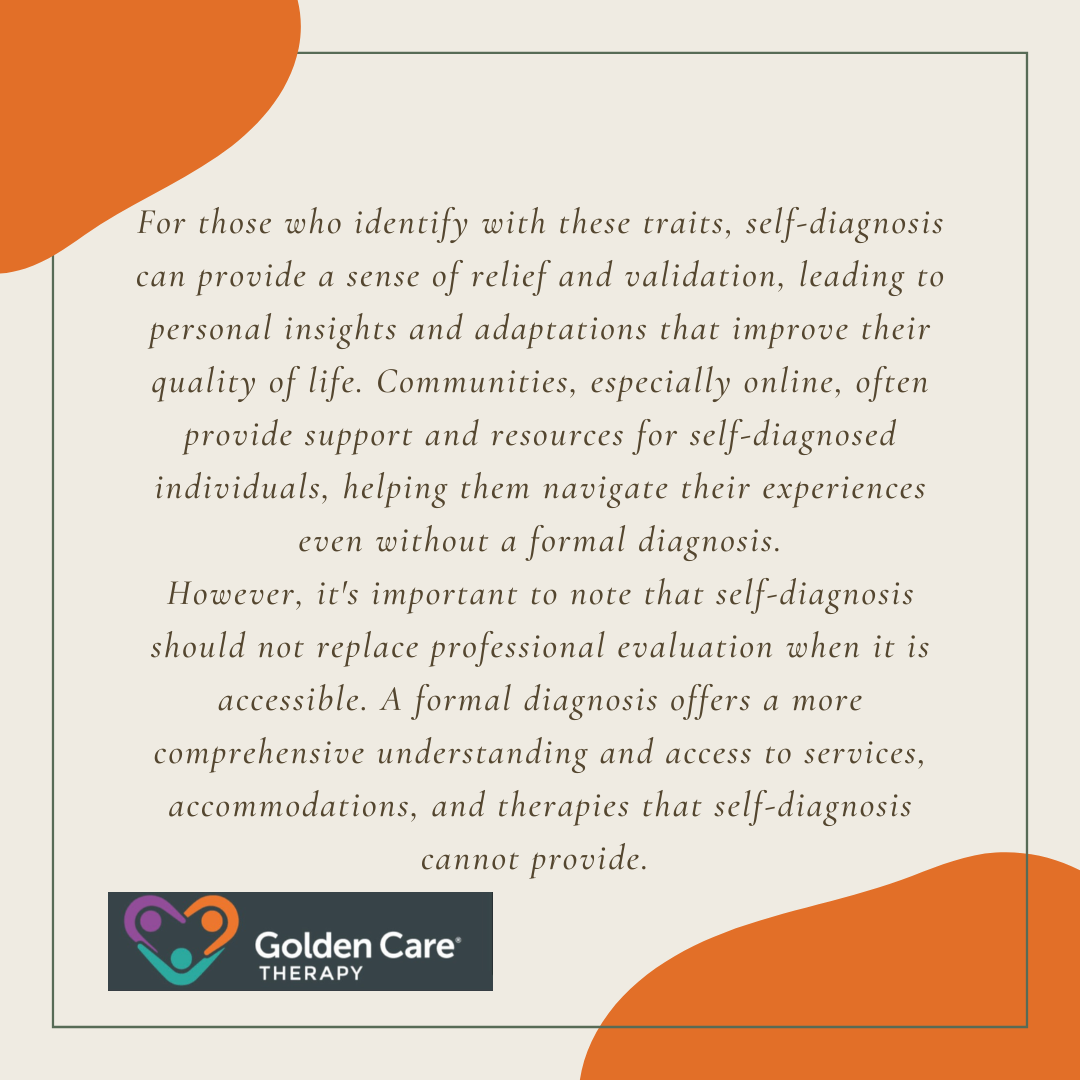
Table of Contents
Self-diagnosis of autism has become a growing topic of conversation, especially in online communities. Many individuals feel they identify signs of autism but have never received a formal diagnosis.
For some, self-diagnosis is empowering – it provides clarity and a sense of belonging. However, others are unsure if it’s the right path, questioning its validity.
Understanding whether self-diagnosis can hold weight in the autism community requires looking at both personal experiences and the role of professional evaluation.
Is Autism Self-Diagnosis Valid?
Yes, autism self-diagnosis can be considered valid in certain contexts. Many individuals, particularly adults, may not have access to formal assessments or may have been overlooked by healthcare systems during childhood.
The growing availability of information about autism has empowered people to recognize traits within themselves that align with the autism spectrum.

Professionals can also rule out other conditions that may present similar symptoms. Ultimately, while self-diagnosis can be a useful tool for self-understanding, it is best complemented by professional guidance when possible.
Acceptance in the Autistic Community
In a recent survey, approximately 64% of autistic respondents agreed with the statement that “A diagnosis should not necessarily be required for someone to identify as autistic.”
This statistic underscores the prevalent acceptance of self-identification within the autistic community. Many individuals find solace in recognizing and understanding their neurodivergence, even without an official diagnosis, as it provides a sense of identity and validation.
For some, self-diagnosis serves as a gateway to self-awareness and a means of connecting with others who share similar experiences. It can foster a sense of community and empowerment among individuals who resonate with the traits and characteristics commonly associated with autism.
However, it is vital to acknowledge that self-identification is a deeply personal journey and may not be universally embraced by all individuals within the autistic community.

Barriers to Official Diagnosis
Despite the growing acceptance of self-diagnosis, there are significant barriers that impede individuals from obtaining an official autism diagnosis.
Half of the autistic respondents and caregivers revealed in the same survey that the pathway to receiving an “official” diagnosis was deemed inaccessible. This highlights the challenges faced by many individuals in accessing formal evaluations and diagnostic services.
Issues such as lack of affordability, limited availability of specialized healthcare professionals, long wait times for assessments, and geographical constraints can hinder individuals from seeking an official diagnosis.
Additionally, concerns related to safety, discrimination, and stigmatization may deter some autistic individuals from pursuing a formal evaluation.
The decision to opt for self-diagnosis over seeking an official diagnosis can be influenced by various factors, including personal circumstances, accessibility of diagnostic services, and individual preferences.
While self-diagnosis can offer a sense of control and autonomy, individuals need to weigh the risks and benefits carefully and seek support from the community to navigate their unique path toward understanding their neurodivergent identity.
Factors that Influence Self-Diagnosis
Exploring the complexities surrounding autism self-diagnosis unveils various factors that influence this process. These factors include ethnicity and gender disparities, risks and concerns associated with self-diagnosis, and the accuracy of self-diagnosis.
Let’s dive further into each of them.
Ethnicity and Gender Disparities
The research underscores significant disparities in autism diagnosis across different ethnic and gender groups.
Studies reveal that autism is notably underdiagnosed in Black and Latinx communities, as well as in individuals who are not cisgender males. This disparity sheds light on the importance of culturally competent assessments and interventions to ensure equitable access to diagnosis and support for all individuals.
Risks and Concerns
Individuals contemplating self-diagnosis of autism often grapple with various risks and concerns. Safety and discrimination issues are prominent among these concerns. Some individuals may opt for self-diagnosis to avoid the potential risks associated with seeking an official diagnosis, especially in terms of safety and potential discrimination.
Seeking community support becomes vital for individuals navigating these risks and concerns.

Accuracy of Self-Diagnosis
The accuracy of self-diagnosis in autism is a topic of debate and consideration within the autism community.
While some individuals may have a deep understanding of autism traits and characteristics that resonate with their experiences, the validity and accuracy of self-diagnosis compared to professional evaluation remain under scrutiny.
Balancing self-awareness with professional assessment is key to ensuring an accurate understanding of one’s neurodevelopmental profile and seeking appropriate support and resources.
Professional Diagnosis vs Self-Diagnosis
The distinction between professional diagnosis and self-diagnosis plays a crucial role in ensuring appropriate support and services for individuals.
Encouraging self-diagnosis of autism can lead to inaccuracies. This may result in individuals not receiving the necessary services and interventions tailored to their specific needs. Self-diagnosis without professional evaluation can contribute to misconceptions and misinterpretations of symptoms.
An inaccurate self-diagnosis can also impact an individual’s eligibility for crucial services and support systems. The lack of a formal diagnosis by a healthcare professional may prevent individuals from accessing specialized interventions, therapies, and educational accommodations designed to address the unique challenges associated with autism.
This can hinder the individual’s ability to thrive and reach their full potential, underscoring the importance of seeking a professional evaluation for accurate diagnosis and appropriate care.
Besides, self-diagnosing autism through social media platforms can create challenges for professionally trained clinicians. Misinformation and inaccurate self-diagnoses can not only undermine the visibility and accommodations for individuals with legitimate diagnoses but also perpetuate misunderstandings and stigmas surrounding autism.
This can potentially disenfranchise individuals who genuinely require support and may lead to delays in receiving the necessary services due to misinformed self-identification.
Importance of Professional Evaluation
While self-identification can be a positive step towards understanding one’s neurodiversity, the role of professional evaluation remains paramount in the diagnostic process.
Seeking a formal diagnosis from a qualified healthcare provider or specialist is crucial for obtaining access to appropriate services, interventions, and support tailored to the individual’s specific needs.
Professional evaluation goes beyond self-assessment to provide a comprehensive understanding of an individual’s unique strengths, challenges, and support requirements.
A formal diagnosis not only validates an individual’s experiences but also ensures access to vital resources, therapies, and accommodations that may enhance their quality of life.
That said, balancing self-identification and formal diagnosis is a nuanced journey that requires collaboration, understanding, and advocacy to ensure that individuals with autism receive the support and resources they need to thrive.
Acknowledging the benefits of self-identification and the importance of professional evaluation can help us foster a more inclusive and supportive environment for autistic individuals. Promoting access to resources such as ABA programs in NJ, Indiana, Georgia, and New York helps us empower individuals to thrive and achieve their full potential.
If you’re seeking personalized support for your loved one, Golden Care Therapy is here to help. Contact us today to learn more about our specialized services and how we can make a difference in your family’s journey.
Sources:
- Disability Rights in Indiana’s Device Policy Shift - October 17, 2024
- Indiana’s Boys & Girls Clubs Partner with UChicago - October 17, 2024
- Navigating Autism in Indiana’s Education System - October 17, 2024
